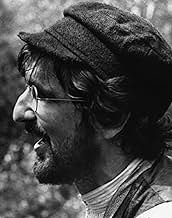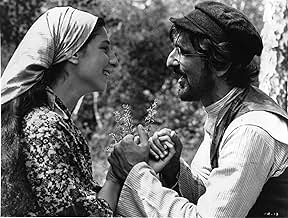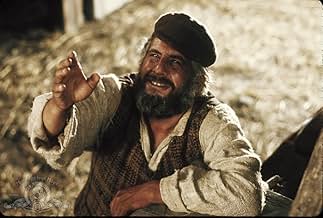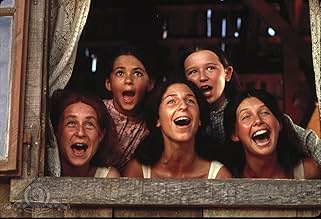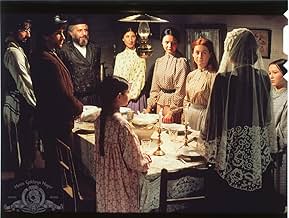Na Rússia pré-revolucionária, um camponês judeu tenta fazer com que três de suas filhas se casem enquanto um sentimento anti-semita crescente ameaça sua aldeia.Na Rússia pré-revolucionária, um camponês judeu tenta fazer com que três de suas filhas se casem enquanto um sentimento anti-semita crescente ameaça sua aldeia.Na Rússia pré-revolucionária, um camponês judeu tenta fazer com que três de suas filhas se casem enquanto um sentimento anti-semita crescente ameaça sua aldeia.
- Direção
- Roteiristas
- Artistas
- Ganhou 3 Oscars
- 10 vitórias e 14 indicações no total
Paul Michael Glaser
- Perchik
- (as Michael Glaser)
Ray Lovelock
- Fyedka
- (as Raymond Lovelock)
Avaliações em destaque
"Fiddler On the Roof" is the stage-to-screen adaptation of the famous musical. It tells the story of Tevye, a poor Jewish milkman in the tiny Russian village of Anatevka. This role is played by Topol, who played the character onstage in the London production of "Fiddler." We see him as a man mired in traditions, but struggling between his devout faith and the changing times when three of his daughters feel the urge to marry. The movie is beautifully shot, and tempers the story, which deals with the harsh realities of Jewish life in pre-Revolutionary Russia, with classic musical numbers sure to put a smile on your face. Between its incarnations on the stage and on screen, "Fiddler" will be immortal.
Let me say up front, I am not predisposed to enjoy a movie like this. On the contrary, as a straight WASP, the last thing I want to watch is a broadway musical or a bunch of Jews 'kavetching' about how bad they have it. That is definitely NOT what this film is about. Though the subject matter is Jewish, to say it is a Jewish film would grossly limit it's significance. It is about the human experience. Any one who has felt pain and persecution will relate to it. Therefore I say every human should love this film. It has an indomitable optimism and remarkable pathos that causes the viewer to empathize with the characters, namely Reb Tevye, played by Topol in arguably one of the finest dramatic performances ever. Considering the lack of success Topol has had with the rest of his career it would literally seem he was born to play this part. This film will most likely not be enjoyable for those looking for spoon fed, mindless entertainment or titillation, but for anyone who appreciates the beautiful things in life, it is high art. I recommend you set aside an undisturbed block of time, (use the can first, it's three hours long) when you are feeling relaxed, eat some good homemade soup and watch this masterpiece. Perfect casting, cinematography, pacing, art direction, wardrobe and best of all, an exquisite soundtrack by the great, and very young, John Williams. Listen to this movie on a powerful sound system and it will sweep you into each musical number. Especially (my favorite) the bar room dance scene. Fiddler on the Roof should be on every top 100 list that exists. Like no other movie I can think of, 'Fiddler' reaches deep into the heart and begs one to look at what things in life are worth living for and dying for.
I know people have complained about the length of this movie. Yeah, it is long, three hours approximately, but there are so many things that compensate. Norman Jewison's direction is very good, and the film is stylishly filmed, with some nice cinematography and there are nice scenery and costumes. The choreography is great, energetic in parts and graceful in others. Next, the music is outstanding. The incidental music largely reminiscent of Russian folk music is a real treat, but the songs are outstanding. The beautiful "Sunrise, Sunset", the fun "Tradition", the idealistic "Match Maker" and the energetic "If I Were A Rich Man", all amazing. Also, Topol, what an absolutely brilliant performance. He put body and soul into Tevye, successfully mixing humour, wisdom and poignancy and the result is one of the most memorable performances in any musical to grace our screens. All the other performances are wonderful, I liked it all five daughters had distinct personalities, and Norma Crane is fantastic as the mother. The story is both tight and poignant, about a milkman of Jewish values, who wishes his five daughters to marry. In conclusion, wonderful and definitely memorable. 10/10 Bethany Cox
The story took place in the village of Russia, 1904. It centered around the leading role, Tevya, who was diaryman. Tevya was a enlightened old man, he had open-minded thought and he deeply loved his three daughters. When he looked into the future of the daughters who were unmarried, he always sang the song "If I am the rich" very kindly, because he fervently expected that they got a bright future.
In the beginning, Tevya was trying to marry off Tzietel, the oldest daughter. The matchmaker found her a matcher in Lazar Wolfm the butcher. However, the butcher was much older than Tzietel, and she didn't love him. she loved a poor tailor, and they promised to each other that they would get married. At last Tevya said yes to them. Meanwhile the second child Hodel, and a poor student also fell in love soon, and they got engaged. They informed her father this and he gave them permission to be married. The poor student was arrested for demonstrating, and was sent to a distant prison, Hodel left to join there. Last, the last daughter , Chava and Fyedka fell in love. Chava told Tevya, and he was outraged, because she wanted to marry out of the faith. She got married anyway, and Tevya disowned her. Soon after that, all of the Jewish people in Anatevka got a notice to move out. And that's the end of the play. Ir's a kind of sad ending.
In the beginning, Tevya was trying to marry off Tzietel, the oldest daughter. The matchmaker found her a matcher in Lazar Wolfm the butcher. However, the butcher was much older than Tzietel, and she didn't love him. she loved a poor tailor, and they promised to each other that they would get married. At last Tevya said yes to them. Meanwhile the second child Hodel, and a poor student also fell in love soon, and they got engaged. They informed her father this and he gave them permission to be married. The poor student was arrested for demonstrating, and was sent to a distant prison, Hodel left to join there. Last, the last daughter , Chava and Fyedka fell in love. Chava told Tevya, and he was outraged, because she wanted to marry out of the faith. She got married anyway, and Tevya disowned her. Soon after that, all of the Jewish people in Anatevka got a notice to move out. And that's the end of the play. Ir's a kind of sad ending.
Opening with the wonderful song "Tradition" which is the overriding theme of the entire musical, with its comedy and its pain, this film is a charming, sentimental telling of the lives and tribulations of a family. The beauty of it is that despite occasional violence against a people, they maintain their spirit through the ages. It's about what every father believes, "There is no one adequate to marry my daughter." Things happen and people get knocked down, and eventually everyone gets to his feet once more. There is the combative relationship between Tevye and his wife, and their love ("but do you love me") that goes pretty much unstated. In the end they continue to stand tall together because what they have put into the world is true love, not the overly dramatic, silly love that permeates our world today. See the movie. See the stage play. You will always leave with an optimistic spring in your step, and wonderful songs in your heart.
Você sabia?
- CuriosidadesThe "Sunrise, Sunset" scene was not lit by electric movie lights but by hundreds of candles, by Cinematographer Oswald Morris. Years later, Norman Jewison said it was the best lit scene in any of his films.
- Erros de gravaçãoWhen the old man is talking to Tevye about Tzeitel, the shadow of the microphone boom is visible on the old man's shirt.
- Cenas durante ou pós-créditosTopol and the cast sing "Tradition" without any opening credits rolling. At the end of the number, the fiddler standing on the left of the screen launches into an extensive solo while the opening credits roll on the right of the screen.
- Versões alternativasOriginally released at 181 minutes (with an intermission); later trimmed for 1979 reissue to 149 minutes.
- ConexõesEdited into 5 Second Movies: Fiddler on the Roof (2008)
- Trilhas sonorasTradition
(1964) (uncredited)
Music by Jerry Bock
Lyrics by Sheldon Harnick
Performed by Topol and Chorus in the pre-credits sequence
Principais escolhas
Faça login para avaliar e ver a lista de recomendações personalizadas
Detalhes
- Data de lançamento
- País de origem
- Idiomas
- Também conhecido como
- Violinista en el tejado
- Locações de filme
- Lekenik, Croácia(Anatevka)
- Empresas de produção
- Consulte mais créditos da empresa na IMDbPro
Bilheteria
- Orçamento
- US$ 9.000.000 (estimativa)
- Faturamento bruto nos EUA e Canadá
- US$ 10.404.330
- Fim de semana de estreia nos EUA e Canadá
- US$ 1.726.942
- 11 de nov. de 1979
- Faturamento bruto mundial
- US$ 10.407.890
- Tempo de duração
- 3 h 1 min(181 min)
- Cor
- Proporção
- 2.35 : 1
Contribua para esta página
Sugerir uma alteração ou adicionar conteúdo ausente






